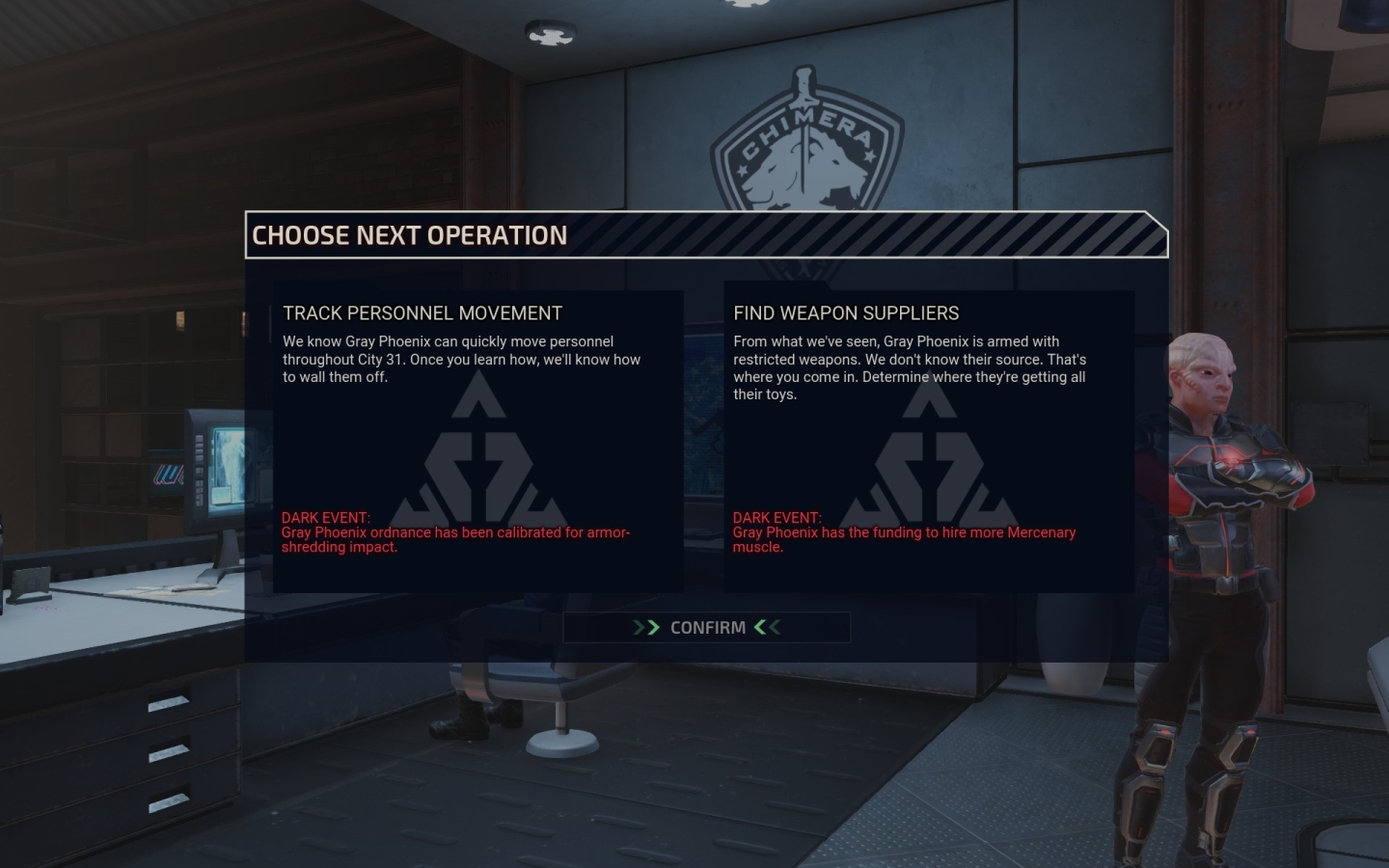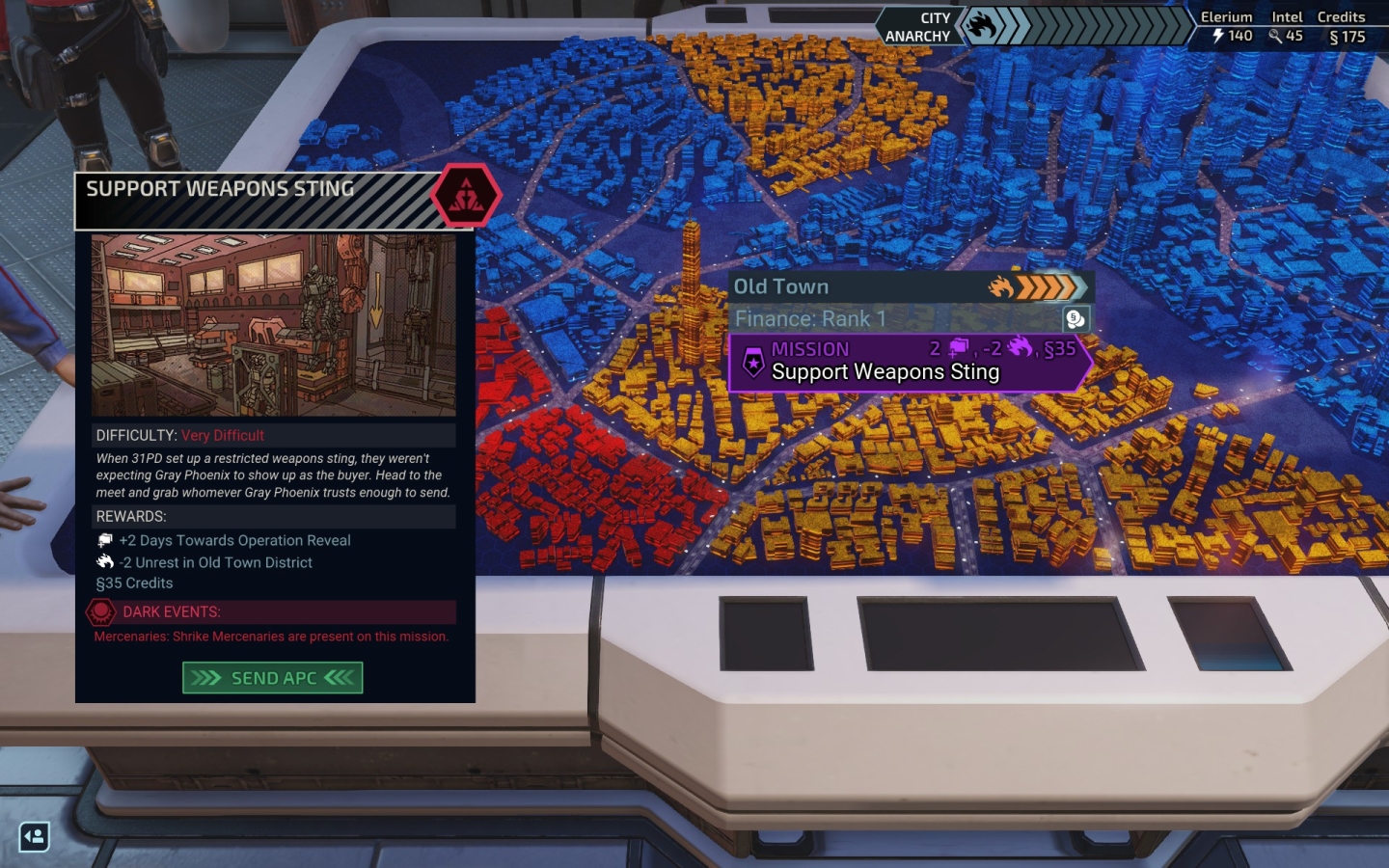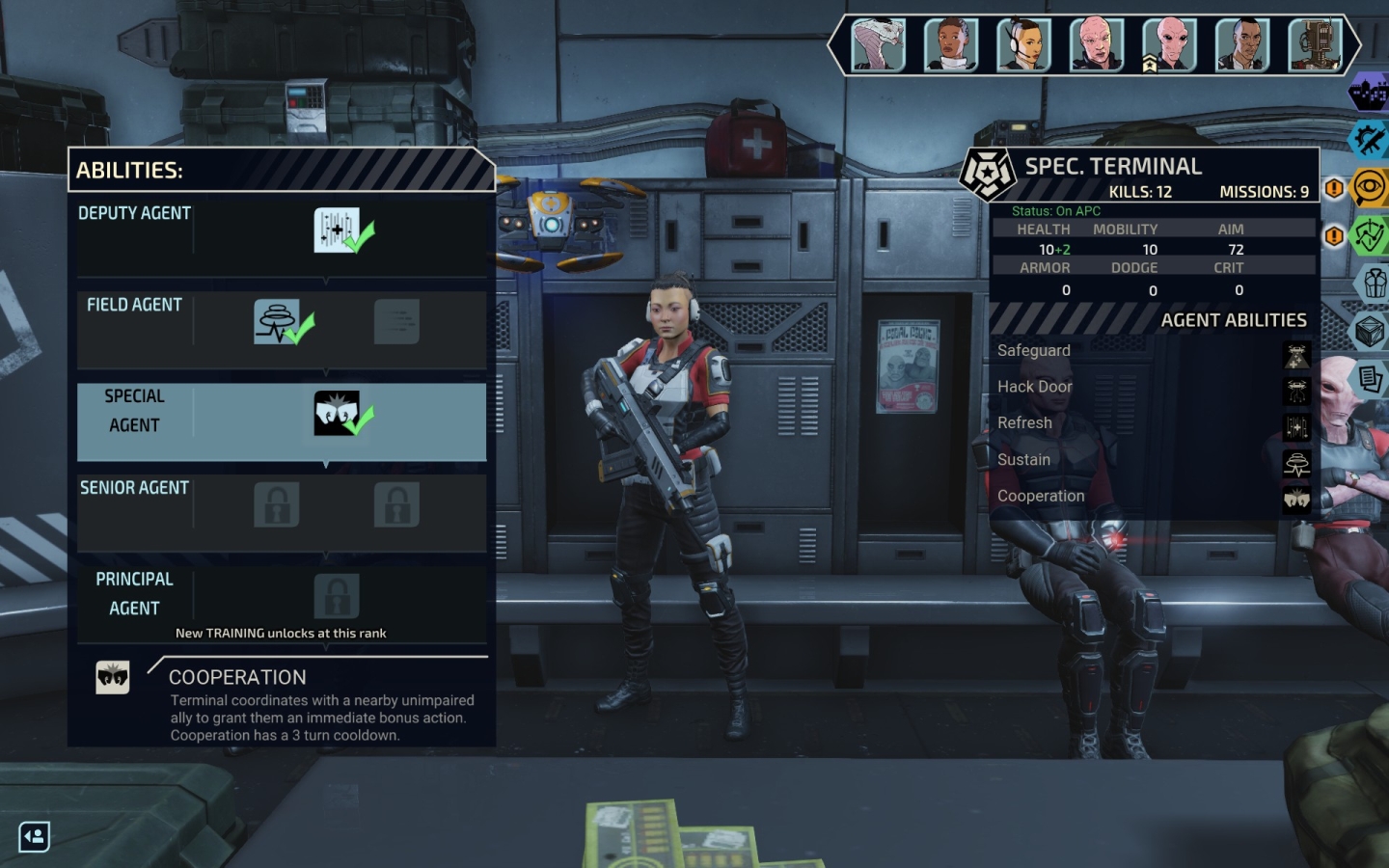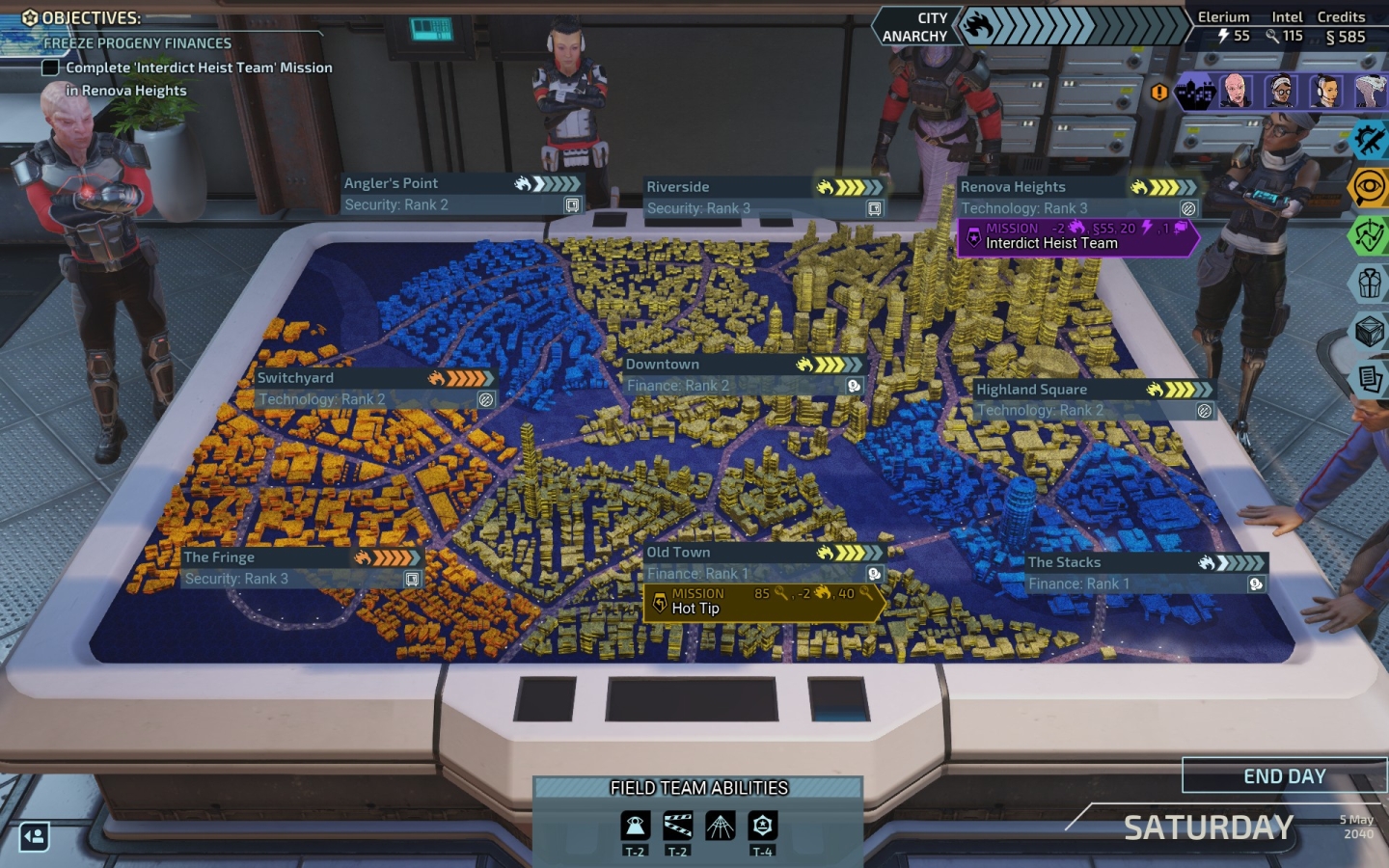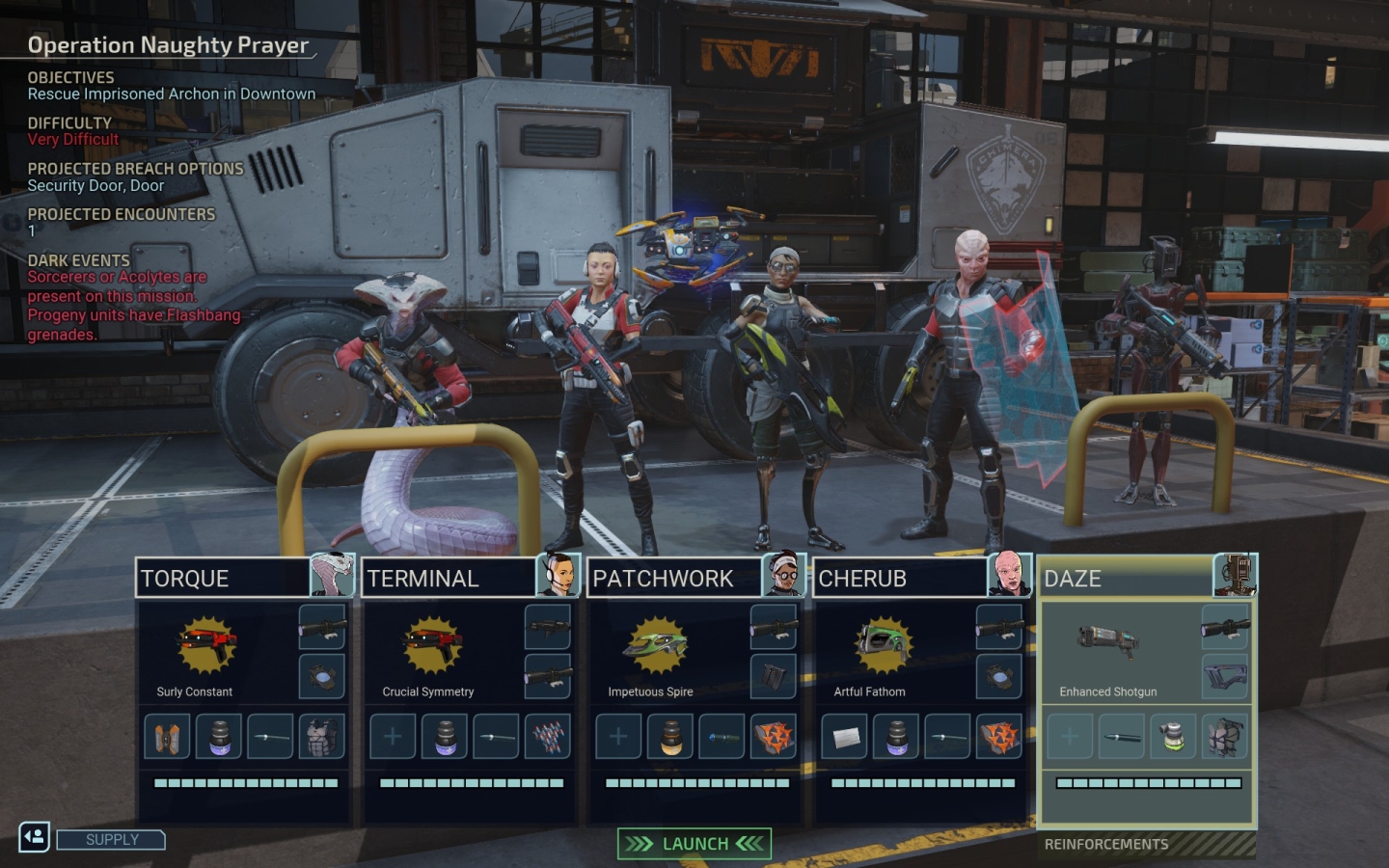Five years have passed since the events of XCOM 2. The Avatar project was stopped, preventing the genocide of the human race. The Overlords have fled, ushering in an uneasy peace thanks to an interspecies alliance. A sectoid is even the mayor of the town where you live — City 31. Not everyone is happy with this turn of events, however, and unruly elements from several factions have begun to cause trouble. You are the commander of the Reclamation Agency, tasked with investigating and taking down the undesirable elements of City 31. The citizens have another name for this ragtag group of humans, sectoids, vipers, mutons, hybrids, and more — Chimera Squad.
XCOM: Chimera Squad opens with a tragedy striking City 31, and both Chimera Squad and the city’s police department dumbstruck as to how it could have happened, or who might be behind it. With their first mission failing in spectacular fashion, their funding and their very existence are immediately put in jeopardy, but hey — it wouldn’t be XCOM if you didn’t start out on your heels and in trouble, right? With the city rapidly descending into chaos, it’s time to assemble.
It’s easy to look at your squad in XCOM 2 and see a collection of stats and weapons. Chimera Squad looks to shake that up with a group of named veterans who have come together to form this special unit. Here, every unit has their own special abilities, making them unique instead of more meat for the grinder. The maps are far more intimate, meaning you no longer have a need for snipers; you’ll settle in with a whole new crew. Sure, you’ll have shotgun-wielding Gremlin-toting Specialists, but now that Gremlin might shock somebody, hack a robot for remote control, heal, or amp up enough to shock everyone in a massive area. Because every character is unique, and as there is so much voice acting both on missions and in between, you’ll get to know each one of them. If you turn on hardcore, you’ll certainly feel it when one of them goes down permanently.
In previous XCOM titles you’ve done your upgrades on the Avenger or the Skyranger. No longer on the run, you’ve instead settled down and established a base of operations for your quasi-law enforcement agency. It’s a fresh outing, so there’s still a lot to research and build, but there is a sense of more grounded purpose. Your squad represents a true and lasting peace between humans and off-worlders, and you see it as the game plays out. Research is no longer just acquired by vivisecting the enemy and analysing their corpses. The team needs to harvest intel and money to be sure, and Elerium continues to be a heavily-sought material for more exotic weapons, equipment, and armor, but now it feels like there is a lot more reason to do so. The uniqueness of each of the troops grants purpose to each piece of gear, instead of just running straight at the top tier stuff. Better still, while you can upgrade your guns to better versions, the real treasures are unique weapons and armor that can grant special traits. Matching the weapon with the soldier wielding it becomes more important than just putting the right gun on the correct class.
Combat has taken a drastic left turn in XCOM: Chimera Squad. Sure, it’s still the tactical game you’ve played for years, complete with all of the “How did I miss with a 95%??” moments you’ve come to know and “love”, but now there is a fresh element that precedes all of that action. Since you are often the aggressor in these police actions, you’ll need to breach the locations where bad guys have holed up. Your team will be presented with choices that have bonuses and costs to weigh. Do you kick open the front door with your shielded team member, knowing that they’ll be hit with Marked status until the end of the encounter? What if you sent your specialist up through a high glass window for high ground? They’ll be up there all alone, and that can be problematic if they get into trouble. What if you brought your Viper team member (who insists she’s a humanoid, but I won’t ruin that for you)? She can sneak through the grate system and pop up where the enemy least expects it. How about some old fashioned C4 against the wall to make your own entrance? Once you decide your approach, you’ll make entry into the room. That’s where the real fun begins.
When you breach, enemies will notice your entry and react in a number of ways. Some may be surprised, immediately seeking cover, but not returning fire. More alert troops may immediately go aggressive and, if not killed in the seconds after you breach the door, will return fire as they bolt for cover. Perhaps that C4 blast (or the sight of an angry muton team member roaring and blasting through the doors) stuns them, granting a round of respite while you position your crew. Buying a single-use electronic lockpick card (or having a hacker on your team) might let you pop open a side entrance, setting your team up with a favorable position with which to set up kill boxes with overwatch. No matter what you choose, there are tradeoffs, but you won’t know whether the risk/reward pays off until you are inside the door and it’s too late to change your mind.
To help with the risks of sending your squad in blind, your team comes equipped with a fresh set of skills and weapons. One member uses a shield that can be used as a bulwark, absorbing all incoming fire. This charges the shield, allowing the wielder to bash enemies in the face for increasing amounts of damage. Your hacker team member can use her gremlin to scan the entire room, holo-targeting (+15% to hit) all of the enemies. Most of the 11 team members have some sort of breach skill that can be used as you kick open the door, or right afterwards, to turn the tide. The hitch is that you’ll be doing from one to three encounters in a single engagement, and you can only use these breach powers once per outing. You never really know what’s in the next room….
The biggest change to the XCOM formula is the introduction of a turn system. In previous titles you’d take your full round, do as much damage as you can with your team, and then brace for impact as all enemy units take their full round of actions. In Chimera Squad, each individual member gets a turn order. This Dungeons & Dragons style initiative system gives each person their own “turn”, based on their stats, bonuses, and skills. Better still, many units have some way to alter the turn order, either delaying for bonuses, teaming up with another player to go earlier in the turn order, or other modifiers to change up your tactics. These combinations create a wealth of combat options that are completely new, and when combined with the fresh payload of powers your units have, it’s a fresh new way to play.
One of the more popular mods for XCOM 2 was a “scar” system that added psychological or physical trauma to soldiers who were gravely wounded in battle. Now baked into Chimera Squad directly, this system ensures that you don’t simply send the same set of agents out over and over. To combat these scars, you can send your agent to training. Time in training is time not going on missions, breaking the cycle of having an A team and a B team. I was surprised to see that every team member is useful, and while I had favorites (looking at you Torque and Verge) I never had any heartburn about changing things up.
As your team gains XP, you’ll eventually get the opportunity to promote. You’ll make permanent choices on your selected skills, as usual, but you can further augment your soldiers by sending them to training. That may grant additional hit points, or at certain milestones, may add additional skills or stats. Given that you’ll only be able to send one person at a time (until you upgrade the facility through research), having somebody taking up that precious slot to remove a ‘scar’ is a painful tradeoff, but so is having that person be ineffective in the field. More tradeoffs.
Inside your base of operations you can launch Spec Ops missions. These “off camera” missions let you send your team members out on missions to seek out Elerium, cash, or intel, taking a few days to do so. Over time you’ll get the opportunity to also go on special missions to lower the overall city unrest, as well as other special activities, but these keep your troops out of the field even longer. They miss out on the combat experience of being in the field, so you’ll want to balance this effort with trigger time, even if it serves to replenish the resource coffers.
You cannot possibly hope to contain the rising tide of unrest in City 31 on your own — you’ll need help. Thankfully, you’ll be able to recruit “field units” to assist. These groups of people will serve as your public relations arm in the city. Selecting Finance, Security, or Technology, these groups will generate cash, Elerium, or intel, paying off on Friday of every week. Unfortunately, you can’t sit back and let all that roll in — the nine districts of the city are in a constant state of upheaval. Taking missions in one district means neglecting another. When those districts max out their meter, the overall city unrest level rises a notch. When multiples are maxed out, it has a multiplier effect. It doesn’t take much neglect to cause the whole thing to spin out of control.
There are multiple warring factions within City 31, and you can’t possibly pursue them all simultaneously. Early in the game you’ll be asked which of the three factions you believe to be behind a terrorist attack, but with little to go on, you’ll need to investigate them for more information. That means capturing informants, taking down criminal cells, retrieving information, and more as you try to uncover the shadowy people behind the scenes. Once you’ve uncovered the players and where they are holed up, you can launch an assault to take them down. Take too long and, like XCOM 2, you’ll suffer the “Dark Events”. Maybe they can hire more muscle to make it harder to take them, maybe they’ll bring psychic soldiers to bear. Either way, you’ll now have the chance to take them alive, courtesy of the new “subdue” mechanic. Once you’ve whittled down their health, you can smash em in the head and arrest them. Incapacitating instead of killing grants additional intel, so it’s best to capture alive when you have the chance.
As you get further into the campaign you’ll begin to break away from single encounters. You might be facing two or three encounters in a row. Downed squad members can be replaced temporarily with android units (which can also be upgraded, but have no real skills to speak of), but having a character die in the field results not in permadeath (unless you toggle Ironman Mode), but a game over screen. You can retry the encounter for a better outcome. If you toggle Hardcore mode that option is removed, just like your save game — any failure results in starting over from the very beginning. And you thought XCOM wasn’t hard enough already.
One of the things I love most about Chimera Squad is that the characters have far more personality this time around. While using mind control on a Faceless, my viper squad member Torque commented “You should make him dance!”. Similarly, when I used her tongue pull on one of my own troops, that soldier gleefully remarked “Ohhh! I wanna go again!” There’s even a whole conversation about eating butter.
There are a few technical hitches with XCOM: Chimera Squad at launch. You’ll see the odd visual bug like characters jittering up and down in place as they can’t quite figure out how to put their feet on the ground. Thankfully, I didn’t run into any line of sight bugs where enemies shouldn’t have been able to target or hit me, but what I did face was far worse — instability. During my roughly two dozen hours with the game I had five full system lockups where only a full reboot would remedy the situation. I also ran into a few instances where the game would get stuck in a loop at the end of a turn, unsure of how to complete the sequence and move on. Force closing the game fixed it, but that bug was present in XCOM 2 — I was hoping it’d be dead with this fresh title.
XCOM: Chimera Squad is XCOM at its finest. The new ways to play are a massive evolution to the series, and I hope that it becomes the norm moving forward. Similarly, I’ve connected with these characters more than the nameless meat I’ve fielded in previous titles. This was a pretty big risk for the Firaxis team, but this one paid off spectacularly.

